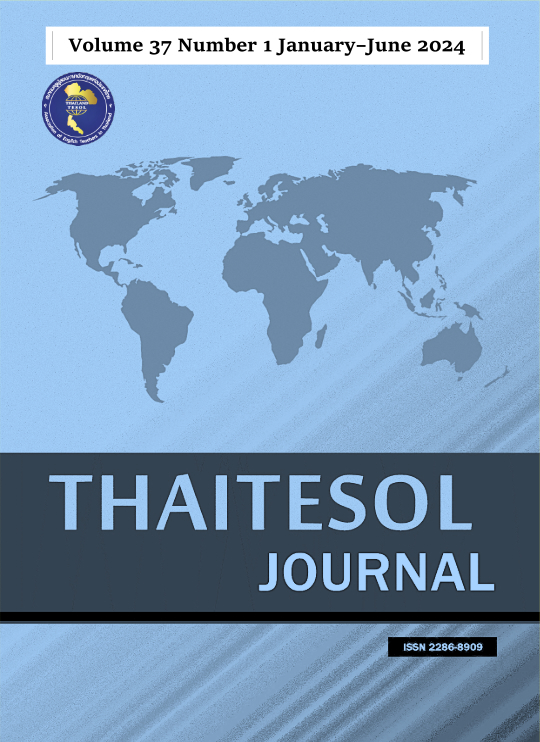Students’ Perception of Face-to-Face and Online Instruction in Foreign Language Learning
Main Article Content
บทคัดย่อ
This research explored students’ perception vis-à-vis of the (dis)advantages of face-to-face and online learning of foreign languages in a tertiary education institution in Thailand. The research took a mixed methods approach utilizing a pre-set questionnaire and a multiple-choice question. Data were collected from 433 students using an online platform and then analyzed using simple statistics. Findings showed that the main advantages of studying online are easy access to the Internet, the self-determined pace of learning, while the main advantage of face-to-face instruction is better social interaction. Conversely, the main disadvantage of studying online is the difficulty of interacting with classmates and the instructor; the main disadvantage of face-to-face learning is students feeling more self-conscious of mistakes made. The findings also indicate the participants prefer learning either in the traditional classroom environment or via the hybrid mode.
Article Details

This work is licensed under a Creative Commons Attribution-NoDerivatives 4.0 International License.
Materials in THAITESOL JOURNAL may be photocopied for educational purposes. Under no circumstances may any part of this journal be photocopied for commercial purposes.
References
Adedoyin, O. B., & Soykan, E. (2020). Covid-19 pandemic and online learning: The challenges and opportunities. Interactive Learning Environments, 31(2), 863–875. https://doi.org/10.1080/10494820.2020.1813180
Arias, J. J., Swinton, J., & Anderson, K. (2018). Online vs. face-to-face: A comparison of student outcomes with random assignment. E-Journal of Business Education & Scholarship of Teaching, 12(2), 1–23.
Arkorful, V., & Abaidoo, N. (2015). The role of e-learning, advantages and disadvantages of its adoption in higher education. International Journal of Instructional Technology and Distance Learning, 12(1), 29–42.
Bagata, D. T. R., Umamah, A., & Fikri, D. (2020). EFL university students’ perception of the use of online learning platform in the COVID 19 pandemic. Jurnal Penelitian, Pendidikan, dan Pembelajaran, 15(34), 1–12.
Bitzer, D., Braunfeld, P., & Lichtenberger, W. (1961). PLATO: An automated teaching device. IRE Transactions on Education, 4(4), 157–161. DOI: 10.1109/TE.1961.4322215
Bozkurt, A., & Sharma, R. C. (2020). Emergency remote teaching in a time of global crisis due to Corona Virus pandemic. Asian Journal of Distance Education, 15(1), 1–4.
Denzin, N. K. (1989). Interpretive interactionism. Sage publications.
De Oliveira Dias, M., De Oliveira Albergarias Lopes, R., & Correira Teles, A. (2020). Will virtual
replace classroom teaching? Lessons from virtual classes via Zoom in the times of COVID-19. Journal of Advances in Education and Philosophy, 4(5), 208–213. DOI:10.13140/RG.2.2.34995.45601
Glaser, B., & Strauss, A. (2017). Discovery of grounded theory: Strategies for qualitative research. Routledge.
Imsa-ard, P. (2020). Thai university students’ perception towards the abrupt transition to “forced” online learning in the COVID-19 situation. Journal of Education Khon Kaen University, 43(3), 30–44.
Kaisar, M., & Chowdhury, S. (2020). Foreign Language Virtual Classroom: Anxiety Creator or Healer? English Language Teaching, 13(11), 130–139. DOI:10.5539/elt.v13n11p130
Kang, M., & Duong, A. (2020). Student perceptions of first-time online learning during the COVID-19 pandemic in Vietnam. Inquiry in Education, 13(1), 1–17.
Kemp, S. (2021). Digital 2021. Thailand. Datareportal. https://datareportal.com/reports/digital-2021-thailand?rq=thailand%20
Krippendorff, K. (2018). Content analysis: An introduction to its methodology. Sage Publications.
Kopp, M., Gröblinger, O., & Adams, S. (2019). Five common assumptions that prevent digital transformation at higher education institutions. INTED2019 Proceedings (1448–1457).
Maican, M. A., & Cocoradă, E. (2021). Online foreign language learning in higher education and its correlates during the COVID-19 pandemic. Sustainability, 13(2), 1–21. https://doi.org/10.3390/su13020781
Mala, D. (2020). Covid-19 fear pushes classes online. Bangkok Post. https://www.bangkokpost.com/thailand/general/1876594/covid-19-fear-pushes-classes-online
Martin, F., & Bolliger, D. (2018). Engagement matters: Student perceptions on the importance of engagement strategies in the online learning environment. Online Learning Journal, 22(1) 205–222.
Mulyani, M., Fidyati, F., Suryani, S., Suri, M., & Halimatussakdiah, H. (2021). University students’ perceptions through e-learning implementation during COVID-19 pandemic: Positive or negative features dominate? Studies in English Language and Education, 8(1), 197–211. DOI:10.24815/siele.v8i1.17628
Nambiar, D. (2020). The impact of online learning during COVID-19: Students’ and teachers’ perspective. The International Journal of Indian Psychology, 8(2), 1–11.
Pichette, F. (2009). Second language anxiety and distance language learning, Foreign Language Annals, 42(1), 77–93. https://doi.org/10.1111/j.1944-9720.2009.01009.x
Poolperm, R., & Boonmoh, A. (2024). Differences in Thai students’ anxiety when speaking in English in onsite and online classrooms. THAITESOL Journal 37(1), 1–23.
Rattanakhamfu, S. (2020). Covid-19 emphasizes the need to bridge the digital divide and reduce
online educational inequality. Thailand Development Research Institute.
https://tdri.or.th/en/2020/05/covid-19-emphasizes-the-need-to-bridge-the-digital-divide-and-
reduce-online-educational-inequality/
Suadi, S. (2021). Students’ perceptions of the use of Zoom and WhatsApp in ELT amidst COVID19 pandemic. Study of Applied Linguistics and English Education, 2(1), 51–64. https://doi.org/10.35961/salee.v2i01.212
Sukman, K., & Mhunkongdee, T. (2021). Thai learners’ voices on learning English online during the COVID-19 pandemic. International Journal of English Language Teaching, 9(2), 1–9.
Toepoel, V. (2017). The SAGE Handbook of Online Research Methods. Sage publications.
Van Ha, X., Nguyen, L., & Hung, B. (2021). Oral corrective feedback in English as a foreign language classroom: A teaching and learning perspective. Heliyon, 7(7), 1–8. DOI: 10.1016/j.heliyon.2021.e07550
Yin, R. K. (2015). Qualitative Research from Start to Finish. Guilford publications.

